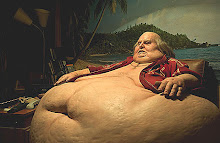When we are in search of valid health tips and information - be it eating lard on bread, choosing low-fat or low-carb or what foods to load up on before exercise – we are more likely to seek and trust information from friends or family over health professionals and scientists.
From where is this mistrust in professionals born?
Do you, like many others out there, believe that “science” is too often continually changing its mind?
The problem lies in the presentation of health information as well as the source that the public are obtaining scientificlly supported articles.
So how often do the public read the articles authored by scientists and health professionals? Very, very rarely. Which yes can be attributed to a lack of access to those articles, but journalists surely can decipher these and present them in the standard Year 9 literacy level required by the mass media?!
Unfortunately that may be a little hard for Journo Johnson who has spent his academic years studying the media and english as opposed to public health issues. Furthermore Johnson’s main motivation at work is to increase numbers – that being circulation of magazines, newspapers and hits on a website.
It is obvious that health information presented to the public should be informative and factual, however articles are pumped out like reality TV celebrities where interesting headings and the attached article often support its claims with ONE study. No one asks what kind of study was it - were there many participants, was it on animals, was confounding present on results obtained? Who funded the study?
Solution?? Allow health reporting journalists to work in conjunction with health professionals to report honestly on health issues.
I know this will never happen, so then the responsibility lies with the reader/consumer. If you the reader can see that the people presenting health information to you are financially motivated – perhaps a health product such as the biggest loser health food, or even smh.com.au who must get hits to make money off advertising space – it is likely they are just telling you something you probably don’t even need to know, because they need to meet demands from a higher power.
Finally, scientists are continually changing their mind, and it is a good thing because opinions often change due to a greater understanding of a food or biochemical mechanism.
Furthermore populations are diverse and ever changing – the nutritional needs of our grandparents when they were our age (I’m 21) were dramatically different due to environmental issues like post war societies, food security, a differing economy and health knowledge. For example posters advertising the use of lard on bread can be substantiated at the time as the nutritional status of the community required it.
Similarly the change in advice of diets from low fat to low calorie can also be substantiated by the need to change food intake in the population at the time. In the 90’s the “low fat” messages got across to many and intakes of saturated fats decreased, however the more pertinent issue of overconsumption must be met for today’s population, hence the change to “low calorie” diets.
Readers: be scrupulous.
Journalists: write stories on what your education commands.





